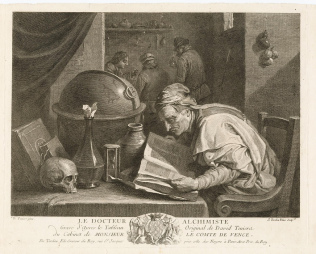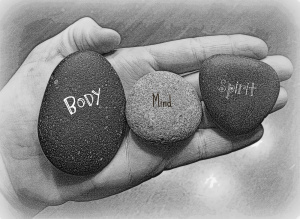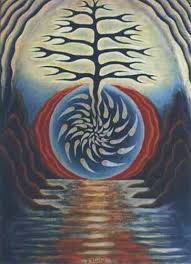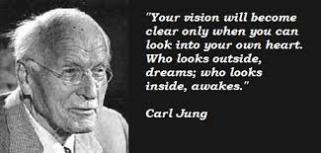Eric Witchey's Blog: Shared ShadowSpinners Blog , page 23
March 30, 2016
Writing at the Limit
Or What I Learned about Writing from Ayrton Senna
by Matthew Lowes
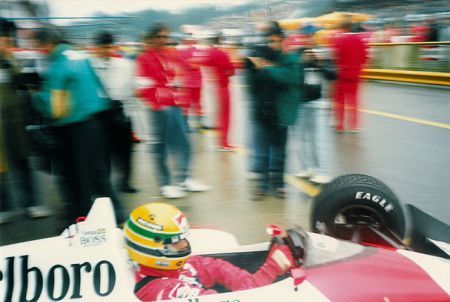
Image by Gabriele, CC-By-2.0
In the 1988 Monaco Grand Prix qualifiers, Ayrton Senna drove what is widely regarded as the greatest lap in the history of Formula 1 racing. Watching Senna drive his McLaren-Honda MP4/4 through the winding streets of Monaco with 1200 horsepower of turbocharged fury screaming behind his back, one has the sense of seeing something extraordinary happen. And this thing, whatever it is — maybe it’s art — could only happen because of one man’s obsession not just with winning, but with driving at the very limit of what’s possible, with pushing himself into realms unknown.
Anyone who has sat in a chair and stared at a blank page knows writing isn’t nearly as visceral as race car driving. Nevertheless, there are real challenges, and there are physical, emotional, temporal, and technical limits. One must also consider genre and linguistic conventions, internal logic, story structure, characterization, conception, design, and deadlines, all of which present various types of limits within the creative effort. And these limits are not just there to make your life difficult. They are there to present you with incredible opportunities.
We often think of limitations as impediment to our goals, but limits are really the prelude to genius. Without them there is nothing to push against, nothing to strive for in our creative work. In fact, when you consider it, the imagination itself may be a tool evolved to overcome limitations. The ability for creative invention is stimulated by challenges and obstacles. And perhaps only at the limit can we discover the truest and deepest potential of our endeavors.
On race day at the 1988 Monaco Grand Prix, Senna extended his lead over teammate Alain Prost so far that team managers were telling him on the radio to slow down. But he didn’t slow down. He kept driving as fast as possible, faster than anybody thought possible. Ultimately, he made a mistake, ran into a wall, and lost the race. Some people look at that and say he threw the race away, and sure he was devastated, but when you listen to Senna talk about his experiences you hear a different story. It’s clear that weekend, driving at the absolute limit, he discovered something far greater than winning a race could ever be.
Without any limitations, we might gaze eternally in beatific wonder at the splendor of an undivided universe. Unaware of any limitations we might sit on the sofa and do nothing at all. Neither one will get your novel written, or short story, or whatever it is you’re working on. After all, “the end” is a limit just waiting to be reached. So find some limits — create them if you must — and push against them! Push against them hard enough for long enough, and something extraordinary might happen. Because while writing may not be as visceral as driving the Monaco circuit in an MP4/4, anybody who has felt the wonder of seeing a story come together at their hands, knows it can be just as thrilling.
Hear Senna talk about his experience at the Monaco Grand Prix:
Tagged: art, creative process, creativity, evolution, inspiration, Matthew Lowes, Short Story Writing


March 23, 2016
Creation Creates Us, by Eric Witchey
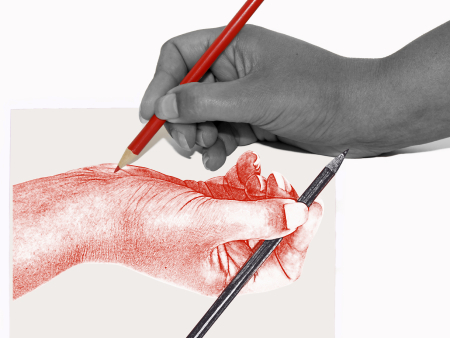
Photo Source: iStockPhoto, dschaef
Creation Creates Us, by Eric Witchey
The world creates writers; writers create the world.
On the quantum level, scientists, specifically my brother, Dr. Nick, who is an actual Ph.D. Particle Physicist, say that our perceptions and expectations may actually influence the manifestation of phenomenon. They definitely influence experimentation.
Much has been made of this concept in the fields of science fiction and fantasy. It’s not a new idea. Writers have been using and abusing it since the thirties. However, we rarely step back and think about the concept as a social phenomenon. Self-help gurus twist it around and talk about it a lot. The Secret movement of ten years ago is an example. It touted the law of attraction and the power of visualization, but it forgot to mention the correlation of success with long, carefully considered, constantly focused hard work. It also forgot to mention the long list of ethical, moral, and legal shortcomings of the people it presented as champions of the program.
None-the-less, the long-recognized value of visualization as a predecessor to success has value. Even Olympic athletes work hard to see themselves performing and winning as part of their training. Of course, we also know that if ten athletes visualize themselves on the top slot of the podium, only one of them will actually end up there. That doesn’t mean the others didn’t perform better because of their visualization. It just means that in the end, we, as a people, prefer to recognize dominance rather than contribution and performance improvement.
Hm… I suppose a strong case could be made for visualization manifestation as a trope of fantasy magic systems.
However, I want to talk about Steve Martin.
No, it’s not a digression. I admit, however, that people who know me and my ramblings shouldn’t be chastised for jumping ship now because it very well could be a squirrel I’m about to chase, and that squirrel could end up climbing a tree and laughing at my readers.
But it’s not.
You see, Steve Martin, whom I’ve never met and who, as far as I can tell, is not related to George R. R., has been a part of my awareness of comedy, writing, and film since he first went on stage wearing an arrow through his hat and picking a banjo. His career has spanned decades and gone from early, totally silly stage performance to serious writing and acting that has enriched our culture.
Also, I long ago read somewhere that he likes inline skates. So do I. So, I admire him.
Because I admire him, I paid attention to an obscure interview some years ago. In it, the interviewer asked him how he came up with his particular brand of zany comedy all those years ago in the 70s. His response floored me. He said that as an aspiring comedian, he came up around the angry comedy of the Civil Rights and Viet Nam era. This was the period of comedians like Lenny Bruce and Richard Pryor. Mr. Martin said that during that era, the era of the civil rights movement and protest against unnecessary militarism, military-industrial government corruption, population suppression (Kent State, Watts, and Chicago), and outright political corruption (Watergate), he saw a time coming when people would be exhausted and want a kind of humor that was lighter and more superficial. He invented his stand-up character with the silly hat, over-the-top delivery, and banjo in anticipation of that moment.
The moment came. The war ended. Nixon left office. The riots died down for a while.
Steve Martin leapt to the stage with happy energy dancing like King Tut and yelling, “I get paid for doing this!”
And, once again for people who follow my little essays, we come to the moment when we ask, “What the hell does this have to with writing and quantum theory?”
Right now, we live in the land of the political, ecological, military industrial train wreck we can’t stop watching as it happens. Most of us are sick to death of the endless wars, the obvious political corruption, and the corporate harvesting of our hard-earned money. Personally, I have lost two retirement accounts to corporate corruption, and for five years I fought with the banks to keep my house because I made the mistake of following their instructions in 2009. My trust landed me squarely in the debacle of fraudulent foreclosure scams. I was lucky. I was able to spend many thousands of dollars fighting. In the end. I managed to keep my house. Most did not, but that’s another story.
The point is that I’m not alone. None of us are. We are all just exhausted by the inefficient, ineffectual human stupidity all around us.
We are ripe for Steve Martin.
When I seek a new book to read, my emotional exhaustion means I don’t seek out the latest, greatest somber tome on social justice or personal triumph over childhood trauma.
I don’t seek out the classics unless I’m doing research.
I look for something that will make me smile and laugh. I look for a book that will give me a sense that the world can be right even though I know it is not. More and more, I look for books in which small groups of people, communities, come together to create actual, personal bonds. Better yet, I look for stories that show me those connections and make me laugh out loud.
So, this climate of emotional exhaustion and compassion fatigue is real. We live in it. We know it. We do what we can to fight it. We also, all of us, crave a kinder, lighter sense of life, community, and the world.
This deep, massive, underlying hope is an expectation, a proto-visualization of what could be—of what we want to manifest. As writers, we can give this nebulous hope form and put these visions out into the world as tiny seeds around which a new reality can crystalize.
Steve Martin may have once presented himself as “a wild and crazy guy,” but he also presented a sense of joy to the world, and around that sense of joy, others rallied. As his art matured, what began as silliness became satirical humor. His joy for life became both balm and social reform. It became a sort of call to action that people could embrace because laughing and joining together in common jokes let people address real problems in their hearts, their families, and the world.
Some weekend, when you are set up to binge a bit, walk through the progression of his acts and films. Go back and watch The Jerk, The Man with Two Brains, Roxanne, L.A. Story, Planes Trains and Automobiles, Father of the Bride, and Baby Momma. Watch the movement from the predominately silly with social undertones to the socially poignant with comedic undertones.
Do the same with the tales of Sir Terry Pratchett or with the progress of novels from Christopher Moore, to whom I am forever grateful for the greatest zombie line in all of literature, “First brains, then Ikea.”
Are these comedic writers created by their times? Are they creating their times? Are we, as writers, manifestations of the larger consciousness of the world around us, or are we creating the world around us by providing centers around which new visions of self and culture can be organized?
What we visualize can clearly influence our ability to perform. What we manifest in story can clearly influence the visualizations of the people around us. So, does our today’s project bring both salve and escape from our fear, anxiety, and fatigue? Can it? Can it be funny and provide insight and solution that creates a new world?
By all the muses, I hope so. Just for today, I hope my world includes something silly—something that makes me smile and laugh. I hope that my writing influences reality—creates an opportunity for others to visualize a better world in which people can look at one another’s differences, smile, and laugh because we all know we are all hurting and, in the end, we are all in it together.
-End-
Postscript: For people who are interested in taking a March 30th full-day class in Corvallis, Oregon from someone who does a very good job of manifesting humor and social consciousness, check out this link to a seminar offered by Willamette Writers on the River:


March 16, 2016
To Game or Not to Game and The Art of Story by Cheryl Owen Wilson
Herein lies the tale of a six-year-old boy named Max who taught his nana, whose writing had become flat and lifeless, how to rediscover the joy of story.
It’s the year 2016 in the town of Eugene, Oregon, where Max and his mommy live with his nana and papa. Now Max is a typical boy of this era. When not in school you will find him on any number of electronic devices from his mom’s I-phone to her laptop, to his I-Pad or, as he prefers, his Nana’s I-Pad and on occasion you may find him interacting with the television through a device called a Wii. All was well in Max’s world until one day he heard his nana and mommy talking.
Nana whispered in her serious voice, “Hilery we will abide by whatever you decide, but his papa and I think he spends way too much time on his electronic devices. What do you think about having a, no electronics at the dinner table, rule?”
Max could not believe his ears when he heard his mommy say, “Ok, let’s give it a try.”
On the first few nights without his I-Pad Max answered the questions posed to him with one of two phrases. “OK” or “I don’t remember.” Max, by nature was quite a chatterbox, so by the next week Max was bored with his self-imposed silence at dinner. That is when he came up with his game.
That night at dinner he looked around the table and said. “I have an idea. Let’s make up a story. I’ll go first, then papa, then nana, then mommy, then me.” Everyone agreed and thus began several nights of creating stories around the dinner table. Max always started the story, and felt it necessary to correct anyone else who added something to the story he did not agree with, and Max was always the one to end the story. So the story was ultimately just as Max had envisioned it.
After the first week he heard his nana, once again whisper to his mommy, but this whisper was different. “His stories are so complete, plenty of conflict, a protagonist, an antagonist and always a resolution at the end. And his world building is complex. Is he just repeating things he’s seen or heard? “
Of course Max knew his mommy would say, “No, they’re his own made up stories and places.”
Now Max knew the secret to why his nana liked his stories, but he also knew his nana would never believe him if he told her. So, he came up with another plan.
The next night at dinner he looked over at his nana and said. “Nana, now, we’re going to write a ten chapter book about robots and the things who built them. “
Over the next few weeks Max’s nana not only participated in the building of the chapters in his book, she started writing down every word he said and over time it became just Max and his nana writing the story. During dinner he’d whisper things to her so his mommy and papa couldn’t hear. Things like, “Nana when we get to chapter eight there’s going to be a new villain or when Robot X gets poisoned, what the villain doesn’t know is that Robot X has pipes in him that will turn the poison to a healing potion, so he can give it to the other poisoned robots.”
One evening nana came to dinner late and saw Max at the table with his I-Pad. He tried to show her what he was playing. He called it Minecraft and began to tell her about the city he’d created. He offered to build one for her, but she just said. “I’m going to get my dinner now Max and you know the rule, no I-Pad at the dinner table.
The next morning Max had to ask his nana if it was OK to put a new game on her I-Pad as her device was newer than his and supported this new game. He excitedly went to her, and said. “The game is called Love You to Bits and you have to travel all over the universe to find the pieces of the robot girl and put her back together after a dragon blows up her ship.”
“A dragon blows up her ship? Isn’t that scary?” His nana asked.
“No nana, it’s really cool. You have to find clues and when you do you can put her back together just like new.” Max was surprised when his nana sat next to him so he could show her his game as he continued to explain the rules.
The very next day his nana let him show her the city he’d built in his Minecraft game. He couldn’t believe it when she asked him to build one for her. Then he showed her the Plants vs. Zombie game. She really liked the zombies.
That night at dinner he listened to his nana with her happy, excited voice telling his papa about all the games he played. He always knew she’d like them since she liked the stories he made up. He was happy she now knew it too. He didn’t really understand everything she said, but he liked that she was talking about him. “You wouldn’t believe the worlds in these games he plays. Watching him play them made me realize how they’ve given him the tools for world build just as well as any class or book I’ve ever taken or read on the subject. Because of these games when he creates a story it just comes naturally to him.
Papa smiled at his nana and said. “Back when you were a teenager didn’t you ever play Dungeons and Dragons?
“No I always thought it was a waste of time, just like I thought…well never mind what I used to think. What I know now, is gaming is perfect for a writer to learn how to add conflict and tension. You know, amp it up one more notch? In these games there’s another obstacle around every corner so not only is he learning story structure but conflict has become instinctive to him. Not to mention he has to resolve each conflict before he can continue to the next part of the game.”
Max’s nana looked over at him and said. “Max you just taught this old dog a new trick.
Max had no idea what nana was talking about. They didn’t have a dog. So he just watched as papa, and his mommy, and then nana started laughing. He didn’t know why they were laughing. But he started laughing too, because now his nana knew how he made his stories and that meant they could write lots more.
When everyone stopped laughing he said, “Hey nana we need to finish chapter nine and ten. Cause I have a new story for us and this time you’re going to really like it ‘cause mommy says you like ghosts and this one is going to have 20 chapters!”
So all was well once again in Max’s world. He still couldn’t have his I-Pad at dinner, but it was fine, because he was writing stories instead.
Nana says. “The moral of this story is to remember the most common rule in any artistic endeavor. Always try new things, and never say never.”
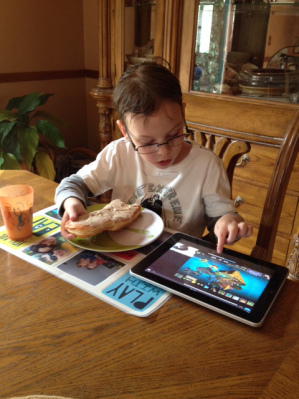


March 9, 2016
The Joy of Deadlines
by Curtis C. Chen
When ShadowSpinners approached me about writing a guest blog post, I readily agreed—then asked for a deadline before I even suggested a topic. Because I love deadlines! No, I’m not crazy. Let me explain…
In 2008, I went to Viable Paradise (VP), a week-long writers’ workshop on Martha’s Vineyard. It was an intense, fun, eye-opening week, during which I pushed myself to write new material faster than I had in a long time. Every day, my fellow students and I had to complete writing exercises while also attending a packed schedule of lectures, critiques, and heavy drinking. (Just kidding about the drinking. Not really.)
When I got home from VP, I wanted to keep that productive momentum going. So I started the 512 Words or Fewer project, wherein I blogged a new piece of flash fiction every Friday. I kept the length requirement short on purpose, so I knew I’d be able to make my word count every week; and I also made the blog public from the start, so I was accountable to the whole world if I didn’t meet my commitment.
I continued doing 512 Words for nearly five years—256 weeks in total—and I learned a lot from it. I learned that my first draft of each scene/story tended to be about 1,000 words. I learned how to find the heart of a piece when cutting it by nearly 50%. Most of all, I learned to stop worrying and love the deadline.
Not every 512 was a masterpiece, but quality wasn’t the point. The point was to produce regularly and consistently: to hit a target, and to get better at shooting for that target each time. You’re not always going to hit the bullseye, but you will improve with practice.
And speaking of arrows, producing a weekly television series is a good encapsulation of this philosophy! (I may be slightly obsessed with TV showrunning. Topic for another time.) The network wants twenty-three episodes a year, you’ve got a matter of days to produce each hour long show, and that content needs to air on time every week, come hell or high water. You can’t wait for inspiration or postpone on a whim. Other people are depending on you.
This principle also holds true for publishing. You may be alone when writing your manuscript, but at some point you’ll need to collaborate—whether it’s with the magazine editor who buys your short, the literary agent who wants to represent your novel, or the Internet artist you’ve hired to design cover art for your indie book. There will be a team of people working together to publish your story, and coordinating between everyone means—you guessed it!—setting and meeting deadlines.
Giving myself an arbitrary deadline for the 512s helped me get used to the idea that a deadline was a deadline, period. External deadlines set by other people may often seem arbitrary. Why did a market close to submissions the day before you finished the perfect story for them? Why does your agent not call for months and then suddenly want you to do a whole bunch of work by tomorrow? The answer, most of the time, is because it’s not about you.
Here’s a #PROTIP: when someone asks you to deliver something by a certain date, never ask why they chose that date. If you need more time on your end, that’s a reasonable request—but you don’t need to explain why you’re busy. (We’re all busy. It is known.) By the same token, don’t question why or how the other person sets their schedule. Respect their process as much as you want them to respect yours.
A popular myth about creative artists is that “having the idea” is the hardest part of the job. Personally, I have too many great ideas and too little time to develop all of them into actual stories. Deadlines help me prioritize my efforts on any given day. Overall, I’m a big believer in constraints fostering creativity: there is some scholarship on this topic, and quite a bit of anecdotal evidence. Knowing how much room I have to build always helps me get started.
Is it possible that forcing yourself to produce on a schedule will dull your creativity, limit your choices, or restrict your growth as an artist? I wouldn’t worry about it. As the saying goes: perfect is the enemy of good. Having a mediocre-but-finished story is always better than a brilliant-but-incomplete piece. You can’t sell it if it’s not finished.
All that said, it’s important to remember that every artist has his or her own creative process. What works for me may not work for you, but I hope hearing a little bit about how I get things done has given you some ideas for how to motivate yourself. Happy writing!
~Curtis
P.S. If you’re interested in Viable Paradise, this year’s workshop takes place October 16th-21st. Applications are open now and close on June 15, 2016. There’s your deadline!
Tagged: creative process, Curtis Chen, deadlines, flash fiction, writing, Writing conferences, writing habits


March 2, 2016
Bring It All
By Cynthia Ray
“If you want to write something, you have to be quite sure that the whole of your being wants this kind of expression. ~Carl Jung, Letters Vol. II, Pages 612-613
This quote made me wonder if my whole being wanted to write, and if so, what it meant to bring ALL of me to the writing process. The more I thought about it, the more I realized that our writing reflects where we are in our journey to become who we really are. The journey isn’t about becoming a writer; it’s about un-becoming everything that isn’t you, so that you can write.
For me, writing is a kind of personal alchemy, a seemingly magical process of transformation and creation. I write and discover hidden things about myself, about others and the world. Writing facilitates my mystical journey of discovery and unbecoming.
As Jung points out, if you are called to writing, you can bring nothing less than your whole self; your flesh and blood, your darkness, your crazy, your passion, your joy, hope and despair. Anything less and your writing will die an insipid death, missed by no one, not even yourself. Don’t leave any part of you behind when you sit down to tell your story, especially the parts that come kicking and screaming.
Wholeness brings power into your voice; a power that can touch, change, heal, give hope or stir others to action (or cast them into despair). Think of the most powerful things you have read, and how they changed your life, or view of the world or yourself.
There is no part of you that will not be required. You have to engage your will, your mind, your heart, your body, and your spirit, and at different times, each of these elements will challenge us.
WILL and DESIRE
Desire motivates your will, and will is the force that carries you forward when things get tough (and I mean reallllly tough). When life’s demands crowd out your precious time to write, will finds minutes and hours where there were none. When you have poured yourself into a story, and have to throw it out, will gives you’re the courage to start over. When the writing you love is not “publishable”, will keeps you writing anyway. When you receive the 20th or the 220th rejection letter in your inbox, will gives you a way. Will keeps you going, but will and desire alone are not enough.
MIND
Our conscious, analytical mind revels in story structure, character arcs, point of view, correct use of tense and grammar, setting all the pieces in order, and comes up with some great ideas. So called left-brainers probably outline everything in great detail, while right brainers are more apt to be pantsers. We spend a lot of time thinking consciously thinking and planning our stories, and we learn what works for us.
And then, in our daydreams, our meditations, up from another part of our mind, that murky subconscious, arise wonderful creative sparks, unexpected inspiration and all that stuff that scares the pants off of us. But keep going, if you dare. There is an even deeper place in there, where all of us are connected, that we also draw from-what Jung calls the collective subconscious.
The more we embrace and explore our endless depths, the more our characters take on dimension and fullness, and our language and stories become tastier and more satisfying.
HEART
Sure, you can have the perfect story arc, precise and beautiful language and fascinating characters in awesome settings, but without the tapestry of feelings, passions, and emotions–without heart–no one cares and our story is a dry husk. We care when we feel connection, and connection emanates from the heart. If we want our stories to beat with the pulse of our readers’ hearts, we have to reveal what it is to be human on the page and close the distance between our words and the reader. Naturally, if we are cut off from our own feelings and emotions, it is unlikely they will show up in our characters.
BODY
Energy! You need energy to write, and the best way to energize your body is to get that butt up from the seat and get out and move. It seems counter-intuitive to leave your writing, but take a break and walk, run, garden, or whatever works for you. Take care of yourself and you will have the energy and clarity of focus to put to the demanding task of writing. Research shows that if you don’t get enough exercise, depression sets in, and you won’t feel like writing (or doing anything else for that matter).
SOUL/SPIRIT
Sometimes we are caught up in inspiration, and things flow through us without effort; we swim in the current and spirit of creation. What a great feeling!
Just as tangible as the body, our spirit infuses everything we do. The Hebrew word for soul (Ruach) can also be translated as spirit or breath. You breathe yourself out into the world through your words and stories. It is a gift, a sound or tone, if you will, that is uniquely you. Your voice/sound merges with all the others.
Hazrat Inayat Khan says, “When one bell is rung, by the sound of that one bell others bells will also vibrate . So it is with the dancing of the soul … It produces its reaction, and that again, will make others souls dance.” Our words are the vibrations we put out into the world.
So, my fellow writers and alchemists, I wish you an unraveling and unbecoming of all that is not you. I wish you wholeness, transformation and abundant creative “juice” to overflowing. Write on!
Tagged: art, collective unconcious, creative process, creativity, depression, Healing, inspiration, Jung, Psychology, Whole Being, writing, Writing Dark Fiction, writing habits


February 24, 2016
The Faith of the Character
One of the first things I do when I’m designing a character for a book is to distinguish that character from me. If I don’t pay particular attention to this detail, the characters all tend to sound like me. Middle age, middle class, average everything. But that, for the most part, does not make a memorable character.
A perfect example of this is in our current political climate. Look at Donald Trump and look at Jeb Bush. Which is more memorable? Which is bigger than life? Which would make a better fictional character?
So I exaggerate certain aspects of my characters’ personalities. I tend to use the Seven Deadly Sins (pride, greed, lust, envy, gluttony, wrath, and sloth) and the Seven Principal Virtues (prudence, justice, temperance, faith, hope, charity, and love), knowing, of course, that no bad guy is all bad and no good guy is all good. We’re all a mix of those things. Pick a few from column A and a few from column B and you have the start of a character.

Today I’m thinking about one character’s faith. He’s not a church going guy. If he were, that would be easy. He’s Catholic. Or Mormon. Or Muslim. Or something else that’s easy to identify. And if you have a character who goes to mass every morning or to the Synagogue once a week or goes to meditation class once a month, you need say little more about the faith that grounds their moral character.
But some of us are more difficult to define than that. Even if you never speak of your characters’ faith, you—as Creator of that character—need to know their heart. Their faith, no matter how flimsy, still underpins the foundation of their actions.
A violent character can feel violent recriminations for his/her actions, based on his or her faith. Or a violent character can feel great justifications for those same actions, depending. And that can be the same character.
Again, we can look to the current group of presidential candidates and see how their faith informs their actions. Or fails to inform their actions. Is a candidate’s actions consistent with how he or she proclaims their faith?
And your characters? Do they toe the line, or do they find justifications for veering off?
Either way, when you know the depth of their faith, you know the depth of their character.
Designing a character is time well spent. Don’t overlook this very basic ingredient.
Tagged: Characters, creativity, deadly sins, designing characters, faith, fiction, principal virtues, writing


February 17, 2016
Tale of an Introverted Misfit
By Lisa Alber
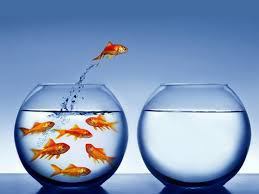
I’ve spend much of my life feeling alienated, like a perpetual outsider, like there’s something fundamentally out of sync with me. And for as long as I can remember, this feeling has chafed at me like psychic sandpaper.
After awhile, feeling like this, anyone could start to believe there’s something fundamentally wrong with them. When really, the only thing that’s “wrong” with many of us is that we’re introverts in a society that worships what author Susan Cain calls “The Extrovert Ideal.”
As a Psychology Today article entitled “Revenge of the Introvert” states, “Introverts today face one overarching challenge—not to feel like misfits in their own culture.”
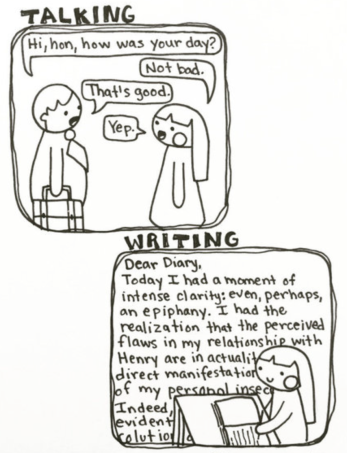
It’s not like my being an introvert is news to me, but I’m just starting to understand the impact of our cultural norms on my general health and wellbeing, and my self-perception.
I’ve been thinking a lot about this lately as related to being an author. I’m preparing to go to a conference called Left Coast Crime next week. I’m a social creature, and I do pretty well in social situations. But, I get overstimulated fast. I need lots of down time. After awhile, if I’m not careful, the first thing out of my mouth in every new interaction is, “I’m sooo tired.” I lose my paltry grip on small talk. It becomes painful to even try.
Most of us introverts have learned to take on extroverted qualities the better to get by. We can’t not, in point of fact. But what does that mean for us?
If you’re anything like me, it means that you get more drained, are in need of more down time, get depressed, and so on. It’s a vicious cycle. It’s almost like we aren’t allowed to accept ourselves as we are. The insidious nature of, well, everything around us constantly signals us that we need to change. We need to be more social, more into group activities, and participate. This is called self-improvement.
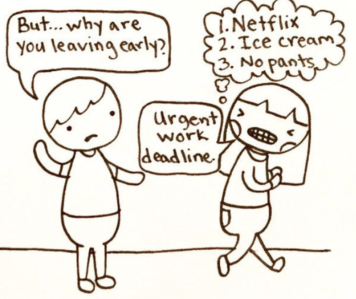
All this, when there’s nothing. wrong. with. us. except that we don’t adequately mirror the larger cultural norms.
Last week I started reading Susan Cain’s book, Quiet, The Power of Introverts in a World That Can’t Stop Talking. It’s fascinating and puts so much into perspective. I’m currently in the middle of a chapter called “When Collaboration Kills Creativity.” It reminded me of a classic introvert-in-a-extroverted-world incident from years ago.
Corporate job. Team-building exercise. Are you groaning? It’s every introverts nightmare. The point of this particular exercise was to prove that groupthink yields better results than individuals thinking on their own.
On our own, we each rated a list of items from most to least important for wilderness survival. Then, we worked together as a group on the same task. Then, we scored our individual results and the group’s results.
The group’s score was supposed to prove the point by being higher than our individual scores. And that was true for everyone in the group–but me. I did better thinking it through on my own without all those loud-mouthed extroverts clogging up my thoughts.
Most of all I remember my boss’s disapproving reaction: as if by doing better than the group, I’d actually failed. I was made to feel bad about my better score. No wonder so many of us are prone to anxiety.
Imagine my satisfaction reading this in Cain’s book (page 74):
One of the more interesting findings … was that the more creative people tended to be socially poised introverts. They were interpersonally skilled but “not of an especially sociable or participative temperament.” They described themselves as independent and individualistic.
That’s me in a nutshell, my friends.
She goes on to make the connection between creativity and introversion by pointing out that solitude is often a catalyst of innovation and since introverts are by nature more solitary …
Given all that, it probably makes sense that I’m a writer. The problem is that the writing game I call “author-com” is way too bloody social. It’s beyond frustrating. More and more it feels like I’ll only get ahead if I get involved. Become a Mystery Writer’s of America officer. Do more talks. Teach workshops. Whatever.
It’s like freaking high school all over again–participating in extracurricular activities I’m not interested in so I can get into a good university.
In her Atlantic Monthly article, “An Introverted Writer’s Lament,” author Meghan Tifft asks, “Since when did the community become our moral compass—our viability as writers determined so much by our team spirit?”
Amen to that, sistah. The pressure to be an extrovert is as alive and well in the writing community as in the world at large. It’s disheartening.
So, next week I’ll go to the conference, and I’ll have a wonderful time. I will. But I’ll also be popping extra beta blockers and worrying that I’m not talking enough and yearning for afternoon naps and room service dinners.
Are you an introvert? What do you do to recharge your batteries in our increasingly hectic world? What about you, extroverts–what’s your take on all of this?
Tagged: creativity, introversion, Psychology, Susan Cain, writing


February 10, 2016
Immersive Writing
by Christina Lay
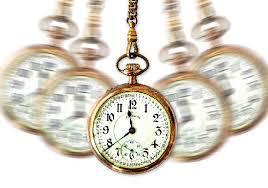
This post was inspired by doing what I’m about to suggest you don’t do: that is, stop in the middle of your writing time in order to research something online. The ironic thing is, the research I stopped to do made me dwell on just why it’s not such a good idea (the stopping).
I decided I needed to look into hypnotism right now and find out what exactly a hypnotist does these days. I assumed there’s not a lot of pocket watch swinging at work, but I did find out that “ocular fixation” is still a common practice. Fascinating as that is, it’s not what I’m here to talk about (see how pesky those interesting tidbits can be?)
What caught my attention was this bit, snipped from Wikipedia, on the topic of “hypnotizability”, which is a great word, by the way. Research done by Deirdre Barrett on the susceptibility of subjects to hypnotism suggest that ” Fantasizers score high on absorption scales, find it easy to block out real-world stimuli without hypnosis, spend much time daydreaming, report imaginary companions as a child and grew up with parents who encouraged imaginary play.”
In my opinion, fantasizer equals writer. The article goes on to talk about self-hypnosis and how those with a high hyponitizability score find self-hypnosis easy to perform. It dawned on me that what I do when I immerse myself in writing is very much like self-hypnosis.
Is this a good thing, you might ask? I believe so. When I achieve a state of full immersion, of dreaming the story, I reach that zone where “the story writes itself” or “the characters speak and I transcribe”. It’s the place where I can’t write fast enough to keep up with the words and images flowing out of my mind. This is writer nirvana.
I’ve had friends marvel at how fast and how much I can write in a sitting (let’s put quality aside for the moment, shall we?) I’m talking about a place where story rules. It isn’t easy to achieve or maintain, and it is exceedingly difficult to find the time to make it last as long as I’d like, but I thought I’d share a few of the things I do that help me self-hypnotize into a highly productive state. I’m sure you’ve heard these suggestions before, but maybe with the idea of reaching a semi-trance or meditative state, the suggestions will resonate in a different way. And as usual, this is me sharing my experience, not burdening you with a list of “shoulds”.

Write every day. Or as close to it as possible, even if it’s for only half an hour, or ten minutes. The idea is to keep the juice of the story flowing. When you’re working on a novel especially, you have many balls in the air. In order to keep each ball airborne, you can’t stop thinking about where each ball is. If you touch base with your story every day, I believe your subconscious works to keep the balls from dropping. So when you sit down, instead of starting from a place of inertia, trying to remember who did what last week, the long list of decisions you’ve made are still at your fingertips and ready to feed the day’s new decisions. It is much easier to maintain an internal consistency of character voice and motivation if you speak with your cast on a regular basis.
Write at the same time and place. This is important for the idea of self-hypnosis. You are sending the message to your mind; now is the time when I write. This is the place where I sit for long periods and Dream. Get used to it. Your writing space is where you put aside all other concerns and focus lazer-like on your characters’ journey through imaginary space.
Write in the morning. Walk straight from dream time to the computer, or notebook, detouring only to the coffee pot. Don’t open our email. Write. In this way you will capture the strange and unpredictable flow of your subconscious. I don’t tell my boss this, but I save my best mind for writing, which is my mind before it gets weighed down with the fuss and bother of daily life. Some people are night people, I know that, but if at all feasible, give first thing in the morning a shot. Even journaling before getting out of bed can give your creativity a boost.
Don’t worry about the words. Now, before you stalk off in a huff, let me tell you one of the best pieces of writing advice I’ve ever read. Natalie Goldberg said that writing is like sex—when in doubt, keep your hand moving. Now this is assuming you’ve done your homework, taken so many workshops you have CRAFT oozing out of your ears. You’ve listened to critiques, you’ve internalized the do’s and don’ts and now you’re off to the races. Keep writing and don’t fret over finding the exact right word. Instead of the dreaded internal editor, bring along your internal coach, the one telling you not to drop your left while you jab with the right. You know, your own little Burgess Meredith in the corner telling you not to use so many damn adjectives, or whatever. Listen to little Burgess, but don’t forget you’re in the ring. You’re telling the story now. You’re letting your characters speak. One of the worst pieces of writing advice I ever read (I forget who said it) was to write as if your editor was standing behind you, plucking pages from the typewriter the instant you were finished, and taking them off to the printer. Which means every line has to be perfect before you move on. That way, my friends, lies madness. Not to mention a blank page. Fix it in the rewrite.
Do your research ahead of time, or outside of your immersive writing time. Oh, how I do love the big juicy world wide web. But we all know it’s a black hole of fabulousity and even when it’s not, tuning out in order to look up what that thingy on the whatsis was called in Great Britain during the Regency will break the spell, wake you up and the hypnotic state will be disrupted. Sure, you might find inspiration for a blog post, but what’s more important? Besides, it’s really a good idea to soak your brain in knowledge ahead of time. Research inspires as well as informs, and will enrich your story as you go, helping in the immersive process. Just underline the questionable bits and keep going.
Write when you’re not writing. Tell yourself your story. Slide into the skin of your characters. Visualizing scenes from their point of view whenever you have the chance will aid you when it comes time to spell it out in words. Part of the writer’s agony is the fact that our words never quite live up to the story in our head, but the more we can really see, smell, hear and taste the world of our story the easier it will be to enter that world when we’re sitting at the keyboard. This is a good thing to do when you are performing mundane tasks, or just going to sleep. Be careful when driving, though.
Defend your perimeter. No email. No stack of bills to pay. No compulsively checking your phone to see if New York has called. Now, this is not to say you should remain immobile for hours. Actually, moving is highly recommended for long haul writing sessions. Be careful what you choose to do however. I find walking the dog is a great way to do moving meditation. The dog walks me as I continue in a daydreamy space, nutty professor style. You know what it is you can do to move and be balanced without disrupting your train of thought overly much. Shower, do yoga, fold clothes, whatever, but know that you are still writing.
Set your alarm. If this becomes affective for you, you will forget to go to work or feed the children, and misadventures will ensue.
One of the most important factors in all of this is time. The more breathing room you can give your writing, the more chance you have of reaching a fully immersed state. But don’t think you have to have hours. I’ve had hours, and it is wonderful, but when life goes sideways and I only have half an hour, I find I’ve trained my brain well enough that I can sit at the keyboard and, if I resist the email and the bills, I can slip write into a deep writing state and channel my characters enough to get down a page or two.
The best secret of all about being a tried and true fantasizer is that writing is fun. Yes, it really is. Give it a try, and watch the magic unfold.
Tagged: creative process, creativity, fantasizer, fiction, inspiration, productivity, self-hypnosis, writing, writing habits


February 3, 2016
Three Questions
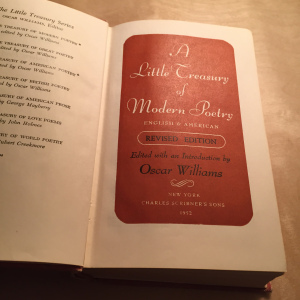 I thought I would follow up my post from last month on some of the influences for my story “A Darkquick Sky”, which appeared in ShadowSpinners, A Collection of Dark Tales, by attempting to answer a few questions related to my work in general.
I thought I would follow up my post from last month on some of the influences for my story “A Darkquick Sky”, which appeared in ShadowSpinners, A Collection of Dark Tales, by attempting to answer a few questions related to my work in general.
What book do you feel has had the most influence on you as a writer?
If I had to pick one, I’d say The Mosquito Coast by Paul Theroux, because reading it, in between my sophomore and junior year in high school, really inspired me to want to write fiction. But many many books have influenced me as a writer, both from before and after that time. As a kid my favorite reading materials included The Savage Sword of Conan, which I acquired with my saved allowance after walking several miles to a drugstore where they sold comic books, and A Little Treasury of Modern Poetry, which I found on my parents’ bookshelf. As an adult, all the books that have blown me away or changed my life, regardless of genre, are a constant inspiration and influence. Here’s a few favorites off the top of this constantly evolving list:
Narrow Road to the Interior – Basho
The Martian Chronicles – Ray Bradbury
Tarzan of the Apes – Edgar Rice Burroughs
Middlemarch – George Elliot
Mona Lisa Overdrive – William Gibson
The Forever War – Joe Haldeman
Victoria – Knut Hamsun
Beowulf – tr. Seamus Heaney
Dune – Frank Herbert
Against Nature – J.K. Huysmans
Snow Country – Yasunari Kawabata
West with the Night – Beryl Markham
The Road – Cormac McCarthy
Moby Dick – Herman Melville
Tropic of Capricorn – Henry Miller
Nausicaa of the Valley of Wind – Hayao Miyazaki
Gateway – Frederik Pohl
Gravity’s Rainbow – Thomas Pynchon
Dracula – Bram Stoker
Perfume – Patrick Suskind
Lord of the Rings – J.R.R. Tolkien
The Aeneid – Virgil
The Time Machine – H.G. Wells
Of your own work, what is your favorite?
That is a difficult question. I think all writers must develop a fondness for their own stories … even the ones that didn’t pan out. But to say one doesn’t have favorites would be dodging the question I suppose. A story called “Waking the Forest” comes to mind, as it’s one of my more serious and perhaps literary stories. But there are many others, and I would be remiss not to mention the epic trilogy of fantasy novels I spent twelve years writing. A lot of sweat and love goes into such a long project, and I’d have to say above all it is my favorite.
What’s up next for you?
I have so many works in progress at the moment, and I’m very excited about all of them. I recently finished a hugely successful $23,000 Kickstarter campaign to fund a tabletop card game called Labyrinth of Souls, and I’ll be working on that intensively until we ship to our backers in June. I have a number of other game projects in various stages of development. I should have a new short story ebook coming out soon called “The Menace of Dupere”, and I’m working toward putting together a collection of my horror stories. I’m currently seeking an agent and/or publisher for my trilogy of fantasy novels, and I have a number of ideas for my next novel waiting in the wings. And at some point I’m going to finish that time traveling wizard story I started a few months back …
You can find out more about my work on my website: matthewlowes.com
Tagged: author, creative process, creativity, fiction, inspiration, Matthew Lowes, writing, Writing Dark Fiction


January 22, 2016
Weigh Your Characters Carefully
By Cheryl Owen Wilson
It’s a New Year and along with this New Year I’m certain either you, or someone you know, has made a vow to lose weight in 2016. You can’t pick up a magazine, turn on the TV or listen to the radio without being bombarded with advertisements promising a shiny new, lighter version of “you”. While I know the topic of weight affects men, since I’m a woman, and the mother of seven daughters, I’ll be addressing this issue from a female perspective alone. So please bear with me for a moment as I vent on a topic, which makes many women set up their New Year for failure, from day one. After I get down from by soapbox, I promise I’ll relate this back to the subject of writing.
Please note, I’m not talking about weight which is causing a person health issues. I’m a cheerleader for eating healthy and getting up off the couch and moving. In this age of information at our fingertips, we have easy access detailing how to live a daily, healthy lifestyle. I’m also quite aware of the flip side to this coin, that side being a person whom society considers too thin. I understand they too can have daily struggles as they try to gain weight.
What has me concerned is the airbrushed, C.G. (computer graphic) altered version of women we are continually shown we must achieve in order to be happy. Happy? In my humble opinion, happy should have nothing to do with an unrealistic number on a bathroom scale. Especially when the number you are told you should be at, for many women over a certain age, will mean they must spend the remainder of their years feeling hungry and deprived. Why, even Oprah has jumped on the weight loss treadmill once again. I’ve wondered over the years, while watching her up and down weight loss, would her career have taken off as it did, had the average American woman not been able to relate to her? What if she’d walked onto the stage from the beginning of her career in those size 10 jeans? Her current advertisement for a popular weight loss organization sounds good. “Let’s make 2016 the year of the best you.” It sounds very good, but is it still based on the number, on a scale?
Now that you have more of an understanding of my thoughts, let’s look at this from the perspective of writing. Think back to the book you are reading or the last book you finished. Do you know the weight of the main characters in the book? In a survey I did among friends, the answer was no. Upon further questioning, what we came up with was, unless the story is specifically about weight; either being severely overweight or severely underweight, the actual “numbers” were never seen on the written page of the book. I found it most fascinating that in a society so obsessed with “the number”, we could not find any in the books we read. We can find terms such as, svelte, willowy, six-pack abs (yes woman can have these too), big boned, chunky, and many more such words. My concern is the weight these words carry. They shape our idea, our view of what beauty looks like and we as writers perpetuate the myth that beauty equals perfection in looks, and the number on a scale. While I know there are certain genres, such as romance where this myth is more prevalent, we have all read in every other genre of fiction as well.
But what if I’m not writing about current day? What if I’m writing historical fiction? Well let’s look back in history to see what was considered beauty, in terms of weight, in our past. In the late 1400’s Botticelli’s paintings depicted quite voluptuous women, who had can you believe it—thighs! Then there were eras in our history when a person’s wealth was easily noted by their girth—a girth which would be considered fat in today’s society. The flappers of the roaring 20’s were quite svelte. Marilyn Monroe’s curvaceous figure in the ‘50’s was well documented, and finally we have Twiggy of the 70’s. I think her name says it all. So if I chose to write historical fiction I’d really have to pay attention to the weight of my characters in order to portray the era accurately.
This weighty subject has opened my eyes to how we as writers of current day fiction, might be playing into the hands of an unrealistic vision of beauty. Are we causing unnecessary distress in our readers as they see themselves in our characters? I’ve asked myself if I want to perpetuate this myth; the one fed to me, and my readers by popular media. For example, if my heroine has girth and is not svelte or willowy, will my readers love her just the same? Or do they want only a heroine planted in their minds by what they see and read, day in and day out? I personally have decided I don’t wish to provide future readers with an unrealistic ideal they may not be able to achieve. So in the future I’m going to strive to be aware of the weight of my characters and how my reader might see themselves in each and every one of them.
What are your thoughts on the weight of your characters?
Tagged: Characters, Psychology, writing


Shared ShadowSpinners Blog
- Eric Witchey's profile
- 51 followers


